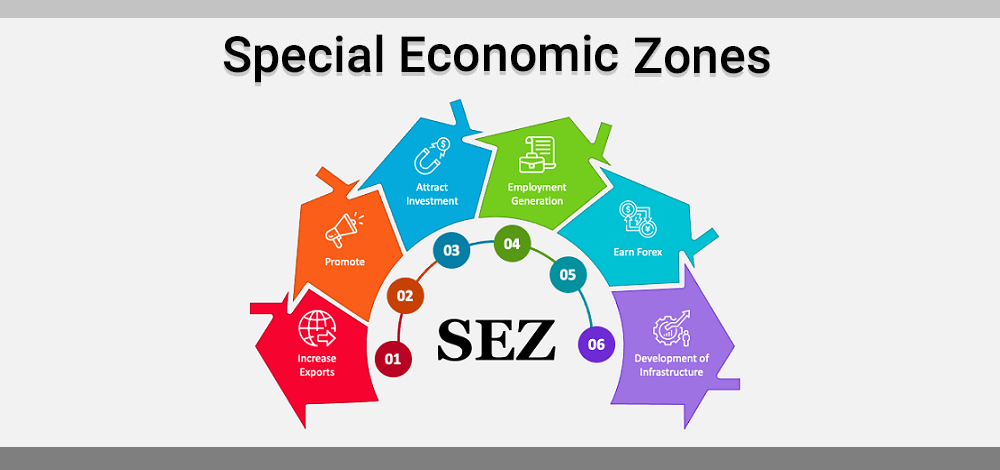
A special economic zone (SEZ) is an area within a country that has business-friendly trade and business laws and is subjected to different economic regulations from the rest of the country. SEZs are set up to boost economic activity, promote exports, boost investments, develop infrastructure as well as create employment opportunities.
Special Economic Zone (SEZ): Importance and useful case studies.
- understand how outsourcing has influenced international trade
- Critically explain the use of SEZ
- Analyse the stakeholders and their positions on SEZ
Special Economic Zones (SEZ) – Purpose
Functions of Special Economic Zones – Government perspective
- Promote regional development
- Export led industrialisation
- Create employment
- Technology transfer
Functions of Special Economic Zone-TNC perspective
- Lowering Production Costs
- Avoiding Environmental or labour laws
- Avoid taxation
China’s first Special Economic Zone: A success story
When Shenzhen was first selected it was a fishing village of 30,000 residents. It didn’t even have a traffic light! Now it has a population of 12.53 million. It has developed from a city known for manufacturing to a city for innovation. Yeung et al, 2009 (Read here).
Watch this video on Shenzhen in your own time. It is good for developing your understanding further of how Special Economic Zones work to attract innovation and young talent.
Clark Freeport Zone
What are the benefits of the Clark Freeport Zone?
Clark Freeport Zone is a special economic zone.
“Industrial zones with special incentives set up to attract foreign investors, in which imported materials undergo some degree of processing before being (re)-exported again” (www.ilo.org).
Watch this video introducing Clark Freeport Zone.
Read more about the history here.
Not All SEZs Are Successful
Special Economic Zones in countries such as China have worked well. However, this is not the case everywhere, read here. They have also been a failure in other countries.
An export processing zone (EPZ) in Dakar, the capital of Senegal, failed due to:
- An excessive bureaucracy
- High electricity costs
- A lack of sufficiently cheap labor
- Zone located far away from the port of Dakar
- Isolated from major trading routes
Here are reasons for the failure of SEZs.
- Quality of the infrastructure (Bad roads and unreliable power supplies deter foreign investors)
- Location
- Zone size
- Zone policies (inadequate maintenance, zone promotion, policy coordination, and tax incentives and disproportionate performance requirements)
- Zone design (Inappropriately designed facilities in zones cause congestion or social problems)
Special Economic Zones and Human Right Abuses
Human rights are rights inherent to all human beings, regardless of race, sex, nationality, ethnicity, language, religion, or any other status. Human rights include the right to life and liberty, freedom from slavery and torture, freedom of opinion and expression, the right to work and education, and many more. Everyone is entitled to these rights, without discrimination.
International Commission of Jurists. The Human Rights abuses of local communities and workers in Special Economic Zones in Myanmar. Read about it here.
Civil society groups have documented human rights violations by the State and human rights abuses by companies resulting from a lack of meaningful consultation, inadequate compensation and limited access to remedies for persons displaced in the development of SEZs in Dawei and Thilawa.
People living on land acquired for these SEZs were displaced without proper planning for involuntary resettlement and before an Environmental Impact Assessment (EIA) was undertaken. Minor infrastructure facilities constructed for the Kyauk Phyu SEZ in 2014 resulted in a deterioration in living standards for persons displaced from farmland.
Special Economic Zones and Environmental Issues
Thailand has several SEZs including one which borders with Myanmar. Open Development Thailand conducted some research into the environmental issues in SEZ in Thailand. They found: reserved forests, water and air quality, and waste management are effected.
The increased demand for land to develop infrastructure as a result of SEZ policies has increased the pressure on forests and agricultural areas. Forested land allocated for infrastructure development as a result of SEZ policies has been chosen from both forest reserves and areas considered to be degraded forests. There are cases where this land has been viewed before these allocations as public land.
These allocations are controversial because they enable government agencies and the private sector to plan land-use changes, without considering existing forest ecosystems or local uses. These situations often lead to conflict.
BATheories.com is managed by a group of educators from Mumbai. We also manage the website StudyMumbai.com. Our panel includes experienced professionals and lecturers with a background in management. BATheories is where we talk about the various business theories and models for BA (Business Administration) students.